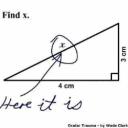Yahoo Answers is shutting down on May 4th, 2021 (Eastern Time) and beginning April 20th, 2021 (Eastern Time) the Yahoo Answers website will be in read-only mode. There will be no changes to other Yahoo properties or services, or your Yahoo account. You can find more information about the Yahoo Answers shutdown and how to download your data on this help page.
Trending News
If you condensed earth I to a black hole would it have the same gravitational pull?
If you condensed earth enough to where it turned into a black hole (hypothetically), would the gravitational pull from the center of the black hole to the original radius of the earth be the same or greater than the average gravitational pull of the earth?
8 Answers
- jackLv 48 years ago
Condensed is not the right word. A black hole is something that is created through implosion rather than inward pressure. The difference is that condensing something would mean that you can push it closer together until their electrons begin to repel each other. An implosion typically breaks away any bonds, and destroys the natural state of particles. Now if I understand it right, if Earth imploded the same way stars do to become black holes, would the gravity stay the same? Well you see, Earth's gravity is different at all levels, it is in fact strongest at its surface and weakest infinitely far away. It is tough to say at the center. Theoretically, there should be no gravity at the very center point because there is so little mass, if any to cause any actual gravity, mathematically, by Newton's equation, there is an infinite amount of gravity at the center. Most of our gravity relies on the geometry of the Earth, being that it is a solid sphere, with a certain radius. A black hole, derived from Earth's implosion would probably be a small, the size of a marble actually. The gravity should theoretically stay the same, but advancing science has proved it may have weaker gravity. This is because a lot of gravity is often focused into it's proximity and later gets really small as it leaves. The event horizon exists for a black holes and even light cannot escape. Simple energy considerations can give us a really general view of this. We know kinetic energy is 1/2mv^2 and potential energy is mgh. When we equate them together and solve for h, we get v^2/g=h, where g is gravity, v is velocity and h is distance from the source of the gravity. We also know that g=GM/h^2, where G is the universal gravitational constant, M is the mass of the Earth and h is simply the radius of the source of gravity. So now we have (V^2*h^2)/GM=h. If we fix up our equation, so we move variables around we get, v^2*h=GM. We then divide the velocity of both sides to get the h alone again. h=GM/v^2. Since we know that the velocity of the object must exceed the speed of gravity, we can calculate the inner bound of the black hole(this is where undoubtedly the speed of light cannot escape. The other methods are much more complicated). h=(6.67*10^-11)*(5.97*10^24)/(3*10^8)^2. Simply this and we get 3.98*10^14/9*10^16 and then we get .004 meters or not even half centimeter, as the distance of no return. You can try calculating for g to find out that much of the gravity is concentrated at this point, as a result, the gravity near the moon gets significantly weaker because much of the gravity is concentrated weaker. To calculate gravity just a few meters away, would require quantum mechanics. But at slightly differing points, you can expect it to drop significantly. The reason why gravity isn't the same at the moon is because we are no longer dealing with ordinary masses, the gravitational field bends spacetime, basically it stretches out space and time so that light cannot escape. This in fact means that gravity has a longer distance to go, which we cannot see. Space is stretched out, or otherwise it could not capture light.
- Anonymous8 years ago
It's said if you condensed Earth into the size of about a peanut, it would turn into a black hole. This is known as the The Schwarzschild radius. And earths pull would be the same as a black hole ( so great that not even light would be able to escape its pull) therefore the blackhole would be greater because its mass is infinite. Hope this helps
Source(s): Vsauce black hole video - PaulLv 78 years ago
The gravitational pull at the radius where the surface of the Earth is now it will be the same. The gravitational acceleration is given by the formula a = GM/r^2.
- Anonymous8 years ago
it is a matter of total mass inside a sphere of radius R
I do not have the formula but it is related to "escape velocity" in a gravitational field
there is an "event horizon where the "curvature of space reaches a critical value
and escape velocity is C the speed of light
fairly far from the event horizon the gravity is just that of the mass at that distance
since Einstein General theory applies it is NOT as simple as the Y Q &A makes it seem
it is possible to have ultra microscopic small "black holes"
Stephen Hawking predicts they can"evaporate"
nobody is sure
for earth mass I estimate the R would be of the order of a few atoms, maybe less
Source(s): bs physics, all I know is "don't get near one - How do you think about the answers? You can sign in to vote the answer.
- 8 years ago
probably would be greater seens how certain stars have been imploded to black holes and had greater gravitational force because they expand. Earth cant become a black hole though so we are safe. Unless the sun somehow becomes one after becoming a giant.
Source(s): Wiki just search up black holes - SAD FACELv 58 years ago
I'm not sure if your question can be answered. This would be hard to model I think, and not an efficient allocation of resources.
Also, this black hole would be so tiny. I'm not sure if we would even have enough data to figure this out. We haven't been able to look at others that small and so couldn't know their behaviour.
Well that's my two cents.





